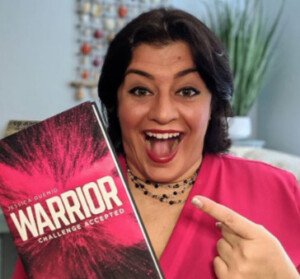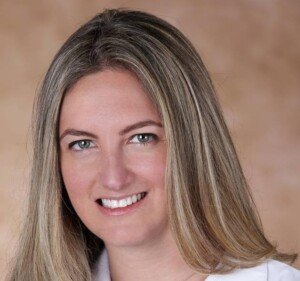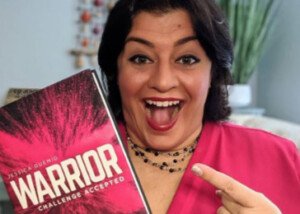At age 32 Jessica Duemig was diagnosed with tripple negative breast cancer.
A survivor, she gives advice and encouragement to the newly diagnosed who need a good shot of badass!
WARRIOR. SURVIVOR. PREVIVOR. THRIVER. Those are terms and hashtags you’re about to start hearing and seeing a lot more of.
Breast Cancer Awareness month is October, but awareness is always in ithe foreground no matter what month it is.
I never used to “get it.” I was confused about why breast cancer had to be pink – seemed a little obvious to me – and was bothered by the fact that for years, we’d all been raising money for cancer research, and yet, the collective “we” were no closer to a cure. How was that possible?
This became a whole lot more real for me and I finally started to “get it” when I was diagnosed with breast cancer in 2017 at 32.
Who has time for breast cancer?
I was single and building my career. By design, I had no children, no pets and no time for it in my busy corporate schedule.
I had zero family history of the disease, no genetic mutations and no explanation as to why I was one of the unlucky ones.
I have never been one to do anything halfway, so when I was told I had a very rare type of cancer, it seemed par for the course. Go big or go home, right?
After the mammogram, ultrasound, multiple biopsies and what seemed like liters of blood taken from my arm, the pathology report came back with my official diagnosis: Stage 2A, triple negative, metaplastic breast cancer.
To break it down for those of us who didn’t attend medical school:
Stage 2 refers to the size of the cancer, in this case 3-5 centimeters (the size of a small lime).
“A” designates whether or not there is lymph node involvement. Thankfully, in my case, the cancer was still contained in my breast.
Triple negative (TN) refers to the sustenance of the cancer cells – what feeds them.
“Receptors are proteins either in or on the outside of cells that can attach to certain substances in the blood,” says Starr Mautner, MD, a board certified and fellowship-trained breast surgical oncologist with the Miami Cancer Institute, who was also Jess’s surgeon.
“Breast cancer cells may have one, two or all three of the following receptors: the estrogen receptor, progesterone receptor and the HER-2 protein.
“The most common type of breast cancer is estrogen receptor positive and progesterone receptor positive and HER-2 negative.
“Certain medications can be given to block the hormones estrogen and progesterone from binding to breast cancer cells and fueling growth.
“Similarly, a medication known as Herceptin or trastuzumab can be used for HER-2 positive receptor tumors to down-regulate the HER-2 protein pathway and slow tumor growth.
“These medications are known as targeted therapies because they can target a specific receptor in breast cancer cells to slow growth.
“Breast cancers that lack all three receptors are known as triple negative.
“This cancer is unique because it is relatively rare (10-15% of all breast cancers), occurs more often in younger patients, is associated with the BRCA1 genetic mutation and has fewer treatment options because they lack receptors.”
Oncologists and researchers are unclear as to what sustains TNBC.
Metaplastic means that there are two cell structures mixed together in the tumor, and that if it spreads, it can metastasize almost anywhere in the body fairly easily.
Metaplastic cancer is the rarest type of breast cancer, is almost always reserved for triple negative and accounts for only about 1% of all breast cancer diagnoses.
Though it only represents a small subset of all breast cancers, TNBC is becoming more and more prevalent in women who otherwise have no predisposition to contract the disease.
Unfortunately, with all that money spent on research, there’s not a lot of information known about TNBC.
TNBC Doesn’t Respond to Hormone Treatment
However, the biggest challenge with this type of cancer, is that since it isn’t directly affected by the protein or hormones, hormone blockers won’t suffice in terms of treatment, and patients are typically subjected to the strongest, most aggressive course of action, usually starting with surgery, followed by chemotherapy and possibly radiation.
“Endocrine therapy won’t work on hormone-receptor negative breast cancer because these cancers lack the estrogen and progesterone receptors [which can be blocked with targeted drug therapy], and their growth is not fueled by hormones,” explains Dr. Mautner.
When I was diagnosed back in 2017, the only statistic that mattered to me was the survival rate, which because I found it early, was actually pretty promising. Check out my article on early detection for more on that topic!
“We’re not going for treatment,” my breast surgeon told me in one of our first meetings. “We’re going for the cure.”
This excited me as I never did anything in my life half-assed. It also meant I’d be in for a very aggressive treatment plan – bilateral mastectomy and eight rounds of chemotherapy.
Make no mistake, despite what you see in October, there is nothing pink and fluffy about breast cancer.
With the goal of survival in my eyes through the surgeries, the treatments and the follow-up appointments, I knew that while this would forever be a chapter in my life, it wouldn’t be the last one.
After a three-and-a-half-year fight, I was designated “medically cured” in February 2020, three years and one week after my initial surgery.
I am a survivor. Breast cancer has broken me down and built me back up – probably stronger than I ever was before.
I wrote a book called “WARRIOR” where I share my battle with breast cancer in the hopes that it will help the many women who need to face the fear of the unknown head-on.
It’s raw, real, uncensored; and it’s written for both the patient and the support squad.
My hope is that this will give anyone affected by breast cancer the clarity and preparation they need to win the toughest battle of and for their lives.
And check out WARRIORGuidebook.com to read more about my battle!
 “WARRIOR” delves deep into the ups and downs of Jessica Duemig’s nine most challenging months as a single, career-driven woman taking on triple negative metaplastic breast cancer. Not a bitching session, “WARRIOR” is about a raw, real, uplifting journey, exploring the hard times, the weird stuff, the small victories and the “What the fuck do I do now?”
“WARRIOR” delves deep into the ups and downs of Jessica Duemig’s nine most challenging months as a single, career-driven woman taking on triple negative metaplastic breast cancer. Not a bitching session, “WARRIOR” is about a raw, real, uplifting journey, exploring the hard times, the weird stuff, the small victories and the “What the fuck do I do now?”
 Dr. Mautner specializes in oncologic surgery including breast conserving lumpectomy, mastectomy, lymph node dissection and biopsy. At MCI she is the lead physician for breast surgery clinical trials.
Dr. Mautner specializes in oncologic surgery including breast conserving lumpectomy, mastectomy, lymph node dissection and biopsy. At MCI she is the lead physician for breast surgery clinical trials.
.










































